Don't wanna be here? Send us removal request.
Text
I totally agree with your thoughts on A Silent Voice!! It was such a beautiful film, and I thought it was such a good representation of school bullying and the consequences of it. It really did show the cycle of self-hatred and that internallized hatred of society, Nishimiya hating herself for the burden she puts on society and Ishida hating himself for the trouble he caused Nishimiya. Both perpetuated by the feelings of society and internalized by the main characters. I also agree with your point on how that is reflective of today's cancel culture.
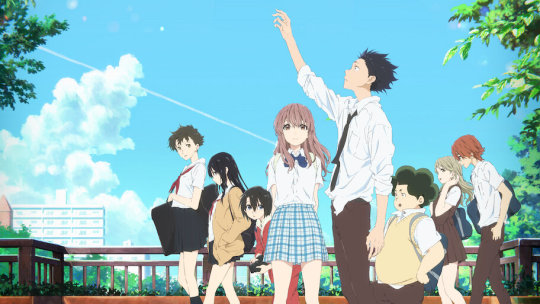
So I just spent the last three days (though mostly yesterday), watching three (kinda four?) different anime for my college course. The first episode of Naruto, "The Pain Arc" from Naruto Shippūden, the film Wolf Children, and the film A Silent Voice, and I have quite a lot to say about them.
Spoilers to the Pain Arc of Naruto and MAJOR SPOILERS for Wolf Children and A Silent Voice!!!
When I signed up to take a course revolving around analyzing anime, there were three popular anime that I had actually heard of that I immediately assumed would appear: Dragon Ball Z, Naruto, and Sailor Moon. Looking ahead at the schedule, I was two out of three (sorry Dragon Ball fans). So finally getting to watch one of those anime I heard so much about, (albeit, the first episode and a single arc), is something I am very happy about. Overall, I enjoyed what I saw. Naruto seems like a fun main character and Pain was an interesting villain with a cool power concept and deep origin.
As for Wolf Children, I will admit that at first, I had a bad feeling. I think it was that the beginning and opening premise reminded me a bit too much of what little I have seen and know about Twilight, something I was not a fan of at all. But I immediately got over my hesitations the moment Hana became widowed with the two children and the real plot began. After that, I enjoyed every part of this film. I especially loved how Yuki and Ame remained two sides of the same coin throughout the film but flipped which side they were on. Yuki at first being the wild child, constantly hunting and running around everywhere, embracing her wolf half, while Ame was the timid one who did not want to be a wolf at all. Then once they both started school, Yuki matured and started hiding her wolf half out of fear, while Ame stopped going to school and began to fully embrace his wolf half, living in the wild. The parallel character development and switch were brilliant, overall, this film felt like a great slice-of-life film of growing up, discrimination, and acceptance.
Then there is A Silent Voice. I am already feeling a bit choked up again just from writing this. I have so much to say about this film I can write an entire post of my thoughts on this film by itself and it would be enough to satisfy the writing requirement for this module's blog writing assignment, but alas. I felt so bad for both Nishimiya and Ishida the whole film. One of the themes for this film was self-hatred and regret. Ishida regrets everything that happened with Nishimiya in elementary school, everything he did, and he is a broken man from the fallout and doesn't truly recover until the very end. Nishimiya hates herself because of the pain and stress that she blames herself and her condition for bringing on to others. They both hate themselves so much that at pivotal points of the film, they attempt to take their own lives. It is such a heavy, yet, well-executed theme. Other characters besides Ishida and Nishimiya showcase other means of addressing their own self-hatred. Sahara chooses to run away and hate herself in silence, Kawai pushes her self-hatred away and convinces herself that she did nothing wrong and that she was a victim, and Ueno pushes all of her hate onto one person. Something else that I found very interesting about this film is how the two characters' self-hatred stems from some form of discrimination. The most obvious one is Nishimiya being deaf, meanwhile, Ishida hates himself because he was discriminated against for being a bully. Though I do not know how intentional it was, but I could not help but draw comparisons to cancel culture with what happened with Ishida. Especially when Yuzuru posted a picture of him online and called him a creep, and there subsequent talk in the rain.
To summarize my thoughts, I thought Wolf Children and what little I have seen of Naruto were both great and very well written! As for A Silent Voice, I highly recommend watching it if you haven't, probably my favorite anime that I have watched so far alongside A Place Further Than the Universe.
4 notes
·
View notes
Text
Naruto, Wolf Children, A Silent Voice
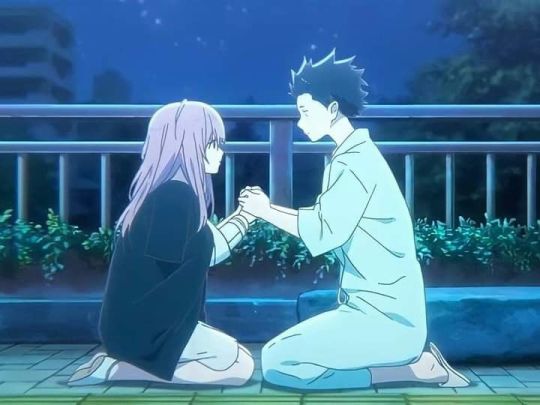
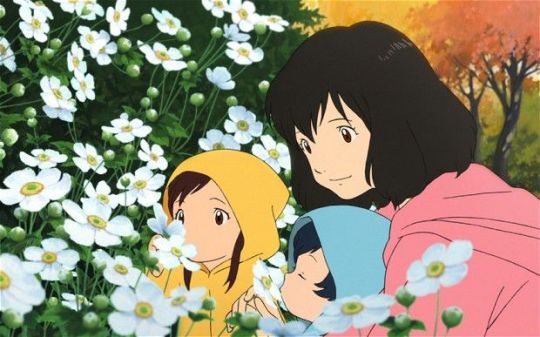
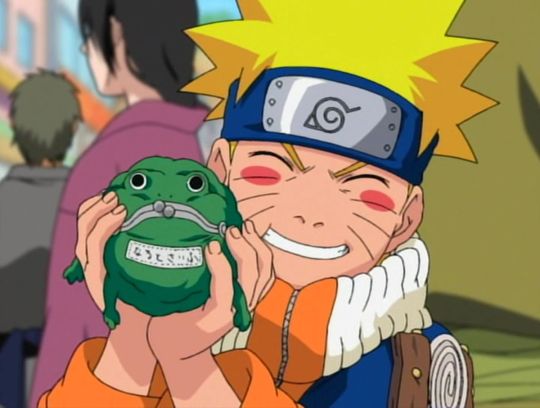
To begin, I just want to start off by saying how much I enjoyed watching these shows and movies. Even with the heavier topics of discrimination, I think it was interesting to see how each work approached the issue in a different way.
In Naruto, his main goal was to somehow assimilate back into society, by becoming a hokage. He felt that in order to end his discrimination that he had to prove himself to society, and to show them that he was not the demon they all thought he was. I think that this is a kind of backwards way to view discrimination, and one that could be harmful to those that are suffering. In a way, this show teaches young kids that in order to not be victimized by society they must be strong and change themselves to fit in and become the hero. That isn’t to say that the show itself is harmful, but its approach to the theme of discrimination could have a negative impact on its young audience.
Similar to Naruto, the movie Wolf Children depicts a family in which the children are both human and wolf. In a similar way, the children are forced to choose to be either human or dog, thus molding themselves to fit into a particular sector of society. The family even had to isolate themselves in the rural village to figure out their identities, and be apart from society. In this movie, society is demonstrated as a rigid, unchanging entity, and because of this those that don’t fit in must change themselves.
Finally, in the movie A Silent Voice, this idea of society being unchangeable is challenged. In order to try to make amends with Nishimiya, Ishida learns sign language, thus demonstrating society’s willingness to change to accommodate those that are discriminated against. It was this action that showed Nishimiya that Ishida did in fact change, and that he wasn't the bully he once was. I think that this movie really demonstrates that it is not the responsibility of those that are discriminated against to change themselves, but rather society needs to change.
1 note
·
View note
Text
Wow you really did a great job of explaining the show! Also, your personal connection made me think of some instances where a child or friend did something unexpected, and I think a lot of people can relate. It just shows that no matter how hard society tries to understand children, there are just some that slip through the cracks. That is a scary thing to think about, but I also think it is important to learn to deal with that fact. Your ideas were so unique and thoughtful!

I recently watched Shin Sekai Yori/From The New World and I must say, the premise around this series is probably the heaviest topic I have come across thus far.
MAJOR SPOILERS for Shin Sekai Yori (From The New World) and Discussion of a Serious and Heavy Topic Below!
I watched this show as part of a college course I am currently taking. Before watching this anime, there was a lecture about some of the context around this anime. Namely, the 1997 "Shonen A killings" in Japan. The name Shonen A is derived of Shonen, the Japanese word for boy, and the "A" is as in number one. The Shonen A killings were when an unnamed 14 year old boy brutally murdered two other children completely inexplicably and threatened to do it again. The lore and premise of Shin Sekai Yori is taking the fear caused by that tragedy to the extreme, having either a or the Shonen A be the first known person to have the Cantus abilities and use them to kill people. After more people like Shonen A, labeled "fiends", do the same, a society is eventually precariously formed to ensure no child ends up becoming another fiend, using genetic modification and creating exaggerated stories to keep them in line. After what happened with K (a telling continuation of the "A" part of Shonen A), even getting rid of any child that shows any possibility of psychological problems of any sort, whether it be isolation or callous disregard for the rules. With some of the major twists of the anime being how far this society has gone to protect the future, even mutating humans without powers into the genesis of the queerats.
I honestly do not know how to feel about this anime. I liked it and thought it was pretty good. But I was not expecting how dark the themes would be, and a lot of them brought back to mind something that happened to a friend of mine.
I had a friend who went to the same school as me in Elementary School that went to the same Middle and High School as I did; I even remember her saying one day that she thought I was the only person who went to the same three schools as her. That was until Senior year of High School, she moved to a different school. The next thing I heard from her was that she got arrested. It was at a prom or school dance, she was bored and not having a good time, so without thinking, she jokingly said on one of her social something along the lines of, "yeah, I'm shooting up the school". Now I will admit, while she did not mean what she said, she was in the wrong and should not have done that, and I do not condone what she did even though she absolutely did not mean it, it was in the end only a joke. But especially in the first few episodes, the comparisons I made from the anime to that were still there. The only difference was what the Tainted Cat did, and I too wonder where she is now, and knowing her, I hope she is doing well.
1 note
·
View note
Text
Shin Sekai Yori
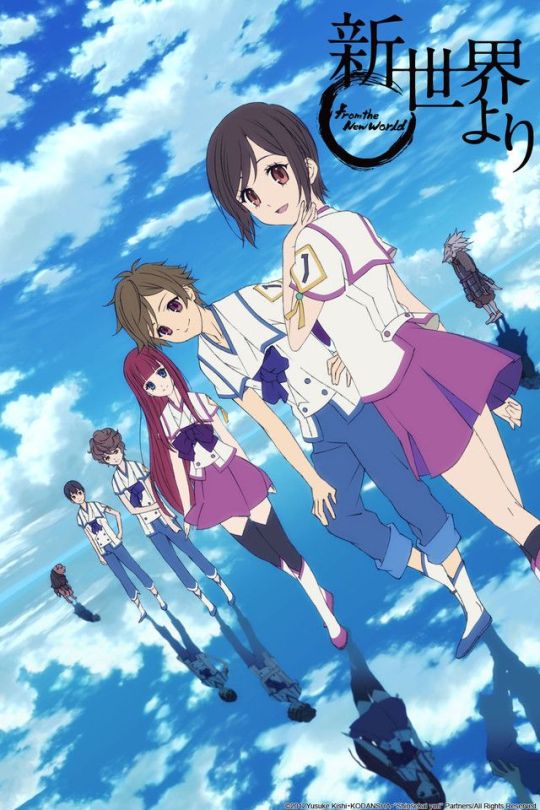
When going into this anime I didn’t really know what to expect. Then after the first scene of the boy ruthlessly murdering the people in the city, I was really caught off guard. It then clicked as I watched why we were assigned to watch this in the first place.
I would like to say that I enjoyed the show, but that would not be entirely true just based on the fact that I don’t love shows like that. However, I will say that it did a great job of creating suspense and making the viewer feel uneasy and anxious. What seemed like a cute story of a group of children at a magic school quickly turned into a thriller of disappearing children, demons, and monsters. It became clear that the children that did not pass the psychological and personality tests that the school gave out were eliminated, demonstrating the idea of a strict surveillance system. Then, when the children eventually found out about the history of their society, and how PK users used to rule, they began to understand the fear of their society. Although dramatized, this show demonstrates in a way how society today treats children, especially in the education system. Those that cannot keep up, or demonstrate tendencies of learning disabilities, are separated from the rest, and increasingly surveilled. They become part of a system, documented and watched over.
Just like in the show, this surveillance can be good, but it can also have negative effects. For one, children who need extra help or attention receive it, but they are deemed as being abnormal and isolated from the “normal” children. No matter how much society aims to understand the psychology behind children and their actions, there are just some cases where their actions do not make sense, like the case of Shonen A. I think that the show does a good job of calling out this fear that society has and shedding light on the idea of the “wild child”. It also proposes the idea of a life where this type of surveillance and punishment system is not necessary, which is not totally realistic but it does offer some hope that this system can be improved in the future.
5 notes
·
View notes
Text
YES!! I loved the show too! You bring up an interesting point about how this show can be seen as a "fortune-telling spyglass". I think it does offer a kind of warning for society about the dangers of technology, especially relevent with the creation of articifical intelligence. I think the scene with the murder in public also stuck out to me because with social media I feel people have started to become apathetic towards violence, and this scene offers commentary on that idea as well. We had very similar ideas, and I also thought this show was a great watch.
"Fools learn from experience, while the wise learn from history."
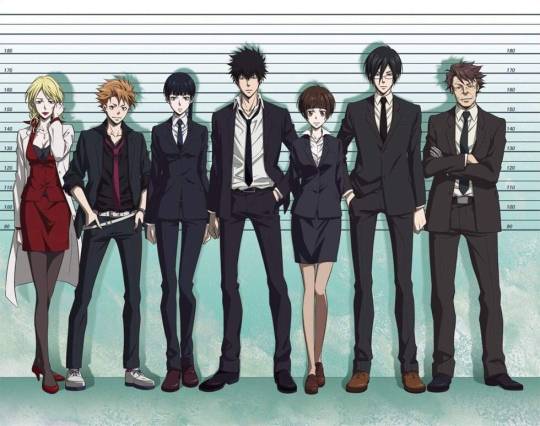
I know I said this before in my last post, but Psycho-Pass might be one of the best anime I've seen this YEAR. I may be biased because of my interest in everything sci-fi, but the anime's concept was executed perfectly. I also love the not-so-underlying theme of ethics in safety and the measures to maintain that safety in society. I think the anime as a whole serves as a fortune-telling spyglass that suggests a world that has a possibility of happening shortly. Over the past few decades, we have had significant technological advancements, which have also raised questions on how these innovations should be regulated, if even regulated at all. Right off the first episode, the viewers are thrust into this futuristic version of Japan, with holographic images and drones all around. The presence of drones all around already presents the idea that in this world, a higher power wants to keep its eye on everybody, everywhere. The first episode does a great job of introducing us to how society works while also keeping the plot moving forward. We learn that citizens are scanned and their mental state is evaluated by drones that the “higher power” controls. When evaluated, a system known as the “Siybl System” determines the risk/possibility of the person committing a crime or being a danger to those around them. This essentially means people can be reprimanded or targeted by authorities because of their thoughts or state of mind. Today, the thought of authorities doing this would be ludicrous, but this anime leaves us rethinking whether something like this is impossible. This very feature is what influences the main plots in Psycho-Pass. We see how society is affected by this feature when a scene of a man brutally murdering someone in public is met with a somewhat apathetic reaction from the crowd. It is later revealed that citizens don’t know how to react to something so absent because they had never had an idea that the act could be possible. Overall, Psycho-Pass isn't just an anime with sleek visuals and high-stakes action; the anime challenges the viewers to imagine and consider the ethics of a world that prioritizes order and safety over individual freedoms.
10/10 from me. See ya!
3 notes
·
View notes
Text
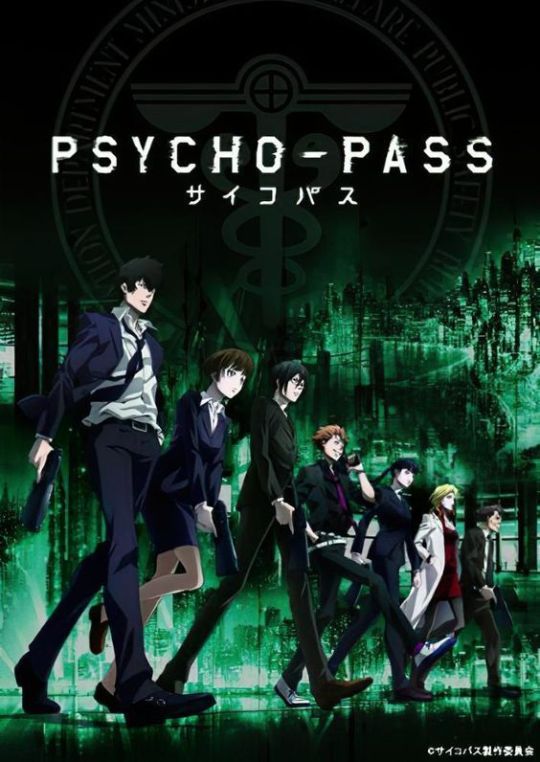
To begin this blog, I absolutely loved this show. The character design, the plot, the animation was just so fun to watch, and it really had me hooked. I would recommend this show to anyone who hasn't seen it thus far.
The whole premise behind the psycho-pass ratings was interesting but also confusing. However, I think this was the point to show that it is hard to rationalize or quantify these ratings of the human psyche because it is nearly impossible to do. The most interesting part to me was the role of the enforcers. These are people that are deemed to have a criminal psyche, however they choose to help out the police force by catching criminals. They were able to do such a good job because they actually were able to rationalize what criminals are thinking, and decipher motives, whereas the inspectors really couldn't as then they would be deemed criminals themselves. That is why I think Ginoza was warning Akane because he saw her starting to become closer to the enforcers, fearing that her psycho pass rating would rise.
The show really took a turn when Makishima began to demonstrate the cracks in the system. When people truly believed that what they were doing was just and right, their psycho-pass stayed level. This was the case of the worker at the factory and of Makishima himself. This made me think about the sybil system and what it considers to be “criminal” thoughts or tendencies. With it being so objective, people who didn’t fit the mold were able to bypass the system. I think this is relevant for society today because it shows that the correctional system should not be a one size fits all system. Everyone’s mental psyche and background is so complex that the treatment for one person may not work for another, and in the age of technology sometimes these systems and algorithms that try to generalize these things just may not work.
Anyway, I think this show was a great watch. Not only does it have good commentary on the increasing use of technology in society but it also was just a cool show.
1 note
·
View note
Text
I loved your thoughts on Eden of the East! I felt like the magic aspect and the idea behind the selecaos was interesting but it also felt rushed too. I think it was interesting to see how people take to the challenge of saving Japan as well as how some just used the money for their own personal gains. But I do see where it had some holes as well, for example how are the actions valued for money. We also never really got the reasoning behind the first terrorist attack, at least the full reasoning. Anyways, very interesting takes on both animes!
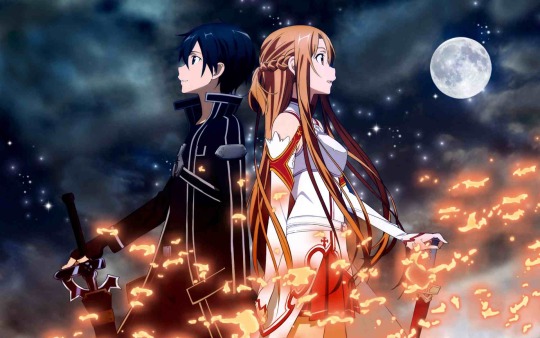
Since the start of the week, I binged watched Eden of the East and up to Episode 14 of Sword Art Online, and I have quite a bit to say about both anime.
Spoilers for the First Major Arc of Sword Art Online and MAJOR SPOILERS for Eden of the East!!!
Beginning with Sword Art Online, two things to address right off the bat. First off, I know there is a lot more to Sword Art Online than up to Episode 14, but I have heard that the show takes a decline at some point, and I was only assigned up to Episode 14 for my college course, so my thoughts and opinions are only referring to everything up to the ending of that episode. Secondly, this was indeed my first time watching the anime, going in completely blind. I say this because the first post I ever made on Tumblr and this blog was "Hello World. I'm back". For my course, I was supposed to write a test message saying, "Hello World", but to test out other stuff (and to be funny because it was my first ever post) I wrote, "I'm back", so imagine my surprise and laughter when that was the first thing Kirito said in the game world. TL:DR: The reference was not intentional. Tangents aside, I really enjoyed this anime, the plot was very enjoyable and had great twists. Even though I know it's far from the final ending, I thought the story, especially between Kirito and Asuna, was really well done and had a beautiful, yet open-ended, ending.
Now onto Eden of the East, even though I decided to watch the films so I could have a fuller picture, (and to know what happened after the show's cliffhanger), I think this has been the weakest link thus far. There are three defining features of this anime to me, its overarching theme and message, the mystery, and the Selecao plot. The theme of critiquing work culture takes center stage and is what the anime does best, being central to the plot and every character. Takizawa is the defender of the little guy, using the collective physical and mental power of 20,000 NEETs to stop the missiles from killing anyone, Saki's entire character arc (outside of her developing feelings for Takizawa) is her struggle to get a job and gravitation towards Takizawa's philosophy, and each antagonist represents a different aspect of arguments surrounding the job system. The Selecao plot of the "magic" phones is a bit hit or miss, it is a fascinating premise that I personally think is executed the best in the first film where the Selecao members are properly shown. While interesting, the Selecao plot does noticeably take a backseat to the main theme and the mystery element of the anime for most of the show. The mystery itself is a good one and worked best at the very beginning, but I personally think it is the weakest aspect of the show and falls flat after the Selecao plot is fully revealed. I feel like the major aspects of the anime's mystery were revealed too fast, making every attempt at further mystery fall a bit flat. The best example is with the Supporter, who is built up to be this scary threat to the Selecao members, just to be suddenly revealed at the end of Episode 10 to be Mr. Outside himself, who is not dead and is Selecao #12. In my opinion, the twist itself has the possibility to work really well, but was revealed to fast. The twist would have worked better if that scene only revealed the #12 was the Supporter and leave the details of Mr. Outside being alive and being the Supporter to when he shows up in the final film.
Overall, I still have enjoyed every anime I have seen thus far. Please do not misinterpret my critiques against Eden of the East as me not liking it, I still enjoyed it very much, just not as much as the others.
5 notes
·
View notes
Text
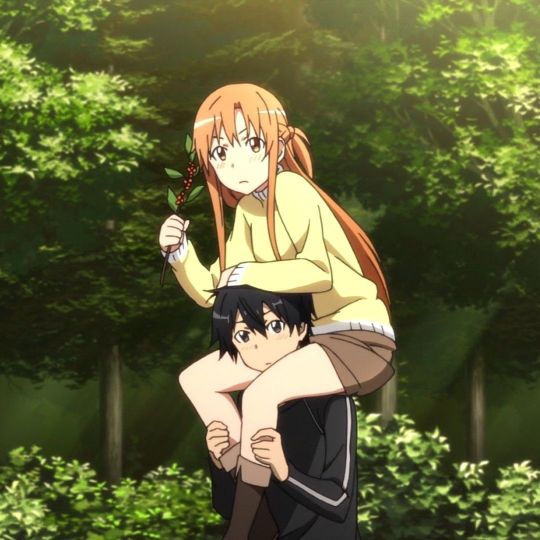
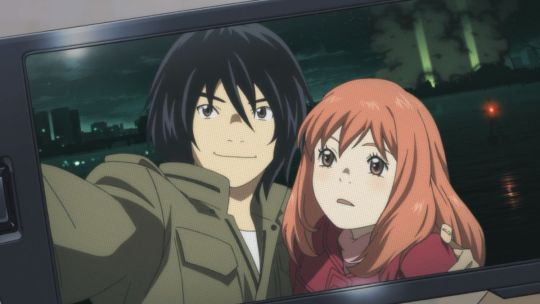
To begin, I thoroughly enjoyed watching the anime East of Eden, so much so that I watched every episode and plan on watching the movies as well. The mystery behind Takizawa’s character and the whole premise of the selecaos kept me hooked and interested the entire time.
In the beginning, I believed that Takizawa had resented the NEETs, condemning them to this punishment, and humiliating them by having them naked. For me, it represented how society views these people, as just useless bodies. What makes Takizawa such a valuable and good savior is that he sees the value in these people. He sees the power behind such large groups, using crowdsourcing as a means of saving Japan. This is increasingly relevant in today’s society where social media plays such an important part in people’s lives. The mob mentality behind social media, Takizawa proves, can be used for good. This perhaps presents another challenge to societal structures, where people in power want citizens to believe that social media is useless or toxic. And yes, I understand that social media is fully capable of being toxic, but it also is fully capable of being utilized for good. Takizawa demonstrates that every member of a society has value, and is important for the improvement of a country, no matter the occupation or social status.
Similarly, this value of the working person is demonstrated in the anime Sword Art Online. This is one that I have watched in its entirety, and I never thought about it through this lens of neoliberalism. For me when I watched it the first time, I felt particularly annoyed with the characters and their lack of drive to return to the outside world. It just didn’t sit right with me that these people were just okay being stuck in the world. But now looking at it through a more economic lens, it does make sense why this world seemed so perfect for them. The lives of the players were just centered around improvement rather than strictly survival. When they worked, they were able to see the tangible value of their labor, and improve their equipment as well as their lives. Why go back to a world where their mediocre job does not allow for social mobility, and where they were stuck in a stagnant life.
0 notes
Text
I also enjoyed both of these animes for the first time too! A Place Further Than the Universe was really a fun watch for me, and I forgot many times that I was supposed to be analyzing it for class. I think that watching the characters divert from normal routine and follow their dreams was really inspiring, and it really caused me to think if I also am living life to the fullest. I also agree with your views of Haku. He really was just a product of his environment and his connection to Chihiro was something I loved to watch. It really does bring up questions of if capitalism really does contribute to a loss of identity within the work force. Anyway, I had very similar ideas and I also liked the personal touch to the train scene!
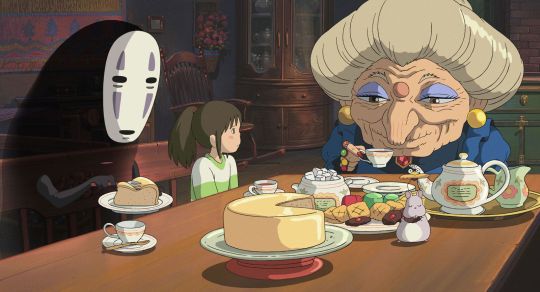
So as of now, I can officially say that I have watched Anime! This past week I watched my first two anime: the film Spirited Away, and the show, A Place Further Than the Universe.
Spoilers for Spirited Away and A Place Further Than the Universe Below!!!
Starting with Spirited Away, I thought the film was a really fun story with fascinating characters, great worldbuilding, and plenty of intrigue. The film does a great job showcasing its themes of criticizing consumerism; from the symbolism of Chihiro's parents being turned into pigs, to No-Face's transformation from literal consumption. Something I admire that this anime did was make consumerism the problem that spurs every major character. Alongside the prior mentioned No-Face, the best example is with Haku, who is implied by several characters to be duplicitous, and even later is shown stealing from Zeniba, ends up being revealed in the end to be a victim of consumerism, forgetting his identity after the river he was a spirit to was filled in.
Moving on to A Place Further Than the Universe, this show was a great feel-good watch for me, that I quite frankly needed. I will admit, I have had a bit of a stressful week this past week, it was the first week of my Summer B classes, and I am taking quite a few, causing me to have to change my normal routine schedule. Then on top of that, my dad suddenly had to go to the hospital for a few days and have a surgery done (he is fine and home recovering now). Watching this anime was likely the best part of this last week. The anime brought out a lot of emotions in me, the first episode when Mari tried going on a train alone brought back good memories of when I traveled alone by plane to visit family over the summer a few years ago (and the sudden cut to Mari being back in class instead of getting on the train got a solid laugh out of me). The reveal that Megumi had been sabotaging Mari and the rest of the cast had my jaw on the floor; I knew she was feeling guilty about something related to the rumors, but I did not think it was that far! I do not really cry too often, but the ending of episode twelve almost did it.
Overall, I had a very good time watching Spirited Away and A Place Further Than the Universe, I would highly recommend watching both of them.
3 notes
·
View notes
Text
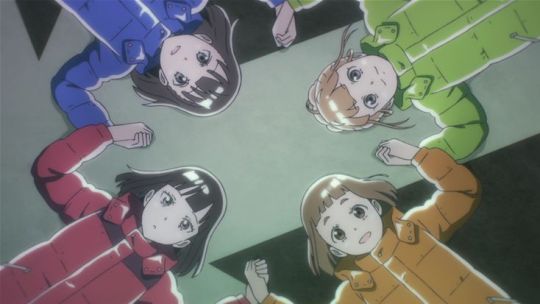
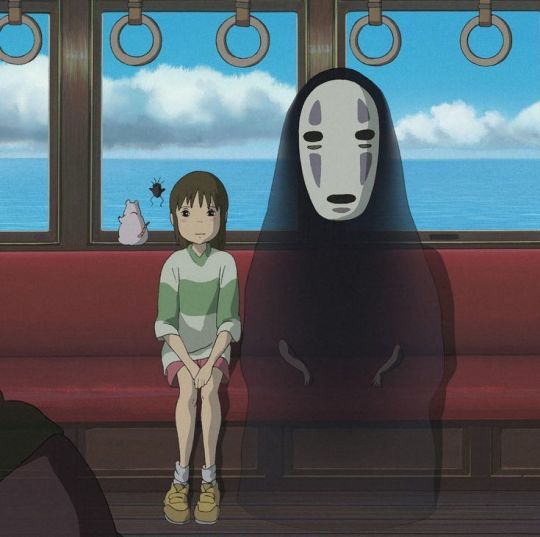
The movie, Spirited Away, for me, demonstrates the negative aspects of overconsumption and capitalism. The greed of multiple characters contributed to their demise, in contrast to the selfless nature of Chihiro, which inevitably saves her parents. In this movie, hard work and tough labor was able to help Chihiro change her parents back from pigs. However, the movie also demonstrates the negative aspects of the labor system and its effects on workers. The spirits were captured in the bath house at the expense of their name, which is a symbol of their identity. Once their identity was lost, they were unable to find a way out of their contracts, and thus stuck there for eternity. In the end, it was Chihiro’s love for Haku that helped get his name back, thus releasing him from the prison of the bath house. This symbolism reinforces the idea that while capitalism is important for society as a whole, it is seemingly inescapable. The uniformity and lack of freedom in the labor system results in conflicts of self-identity and self-worth. Similarly, in the show, A Place Further Than the Universe, it is not just the hard work of the girls that allows them to reach Antarctica, but rather their love for each other and their selflessness that allows them to succeed. The show begins with Maki explaining her fears of the unknown, symbolic of the fears of a society outside of capitalism, but in the end, the girls were able to witness a world free of these pressures. They were able to learn and understand that, in this utopia, money does not drive their society, rather it is hope and faith that pushes them onwards. It is this realization that helps Shirase grieve her mother and open up to the possibilities of new relationships with the captain, as well as her friends. These works together challenge the audience to consider that as essential as capitalism is to our society, it is also important to see from beyond this narrow perspective, and to think about possible life outside of this system, however impossible it may seem.
4 notes
·
View notes